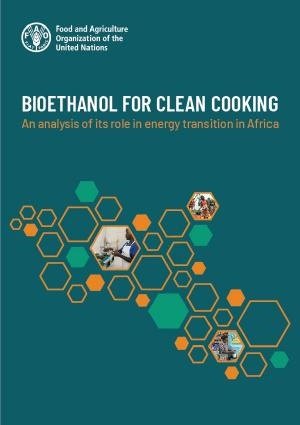People at the core of bioenergy solutions: 12th GBEP Bioenergy week calls for just and inclusive energy transition

Group photo of the 12th GBEP Bioenergy Week participants
©FAO
Bioenergy Youth Day
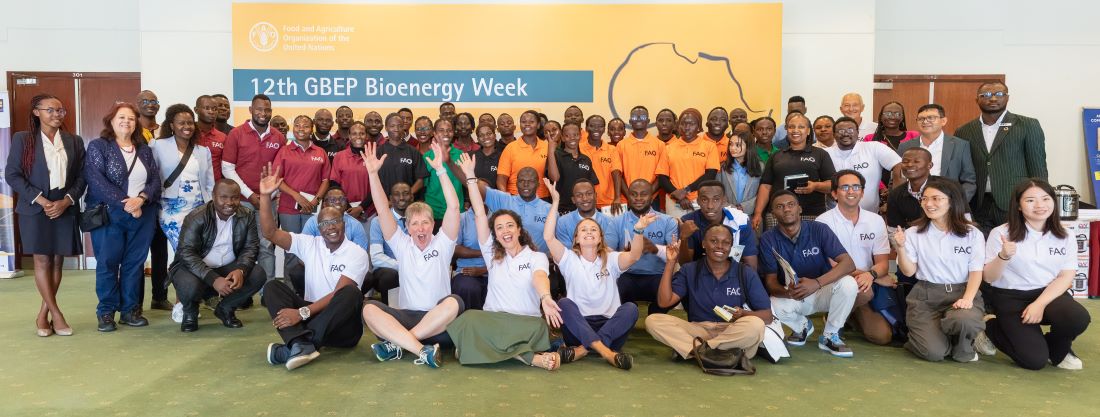
The week opened with the second Bioenergy Youth Day, the first in Africa, which welcomed about 100 young students, researchers and practitioners.
The day, co-organised with Aston University, featured lectures from leading universities and research centres, interactive demonstrations, and testimonies from young innovators, who presented their inspiring gender- and disability-inclusive projects.
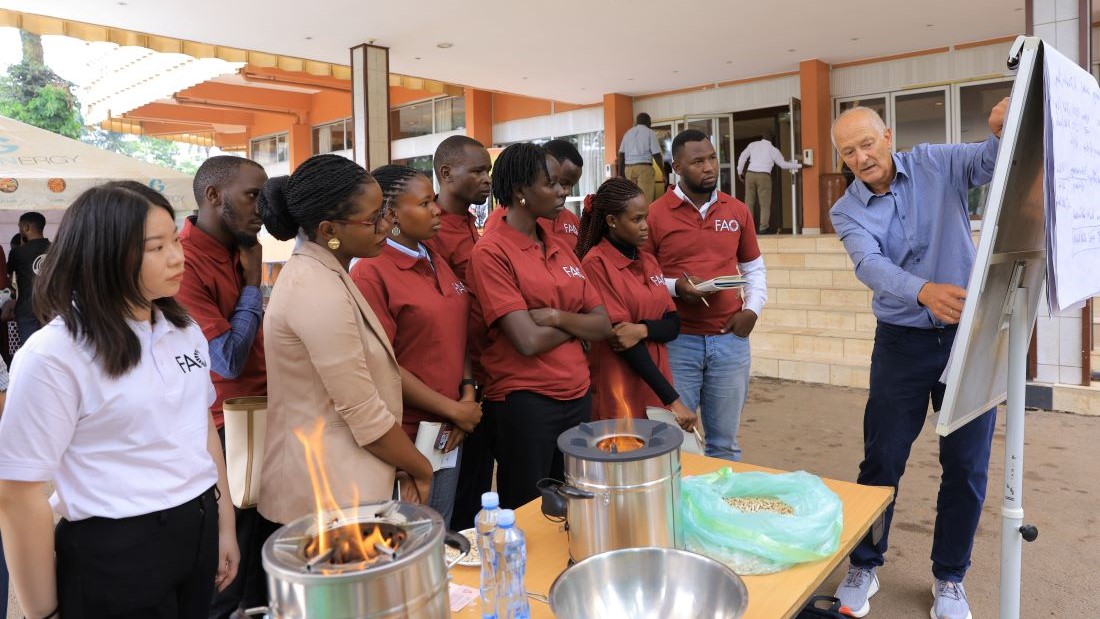
Opening the event, the Hon. Dr. Balaam Barugahara Ateenyi, Minister of State for Youth and Children Affairs, galvanized the young participants by reminding them that they are "at the heart of shaping a sustainable future for the energy sector.”
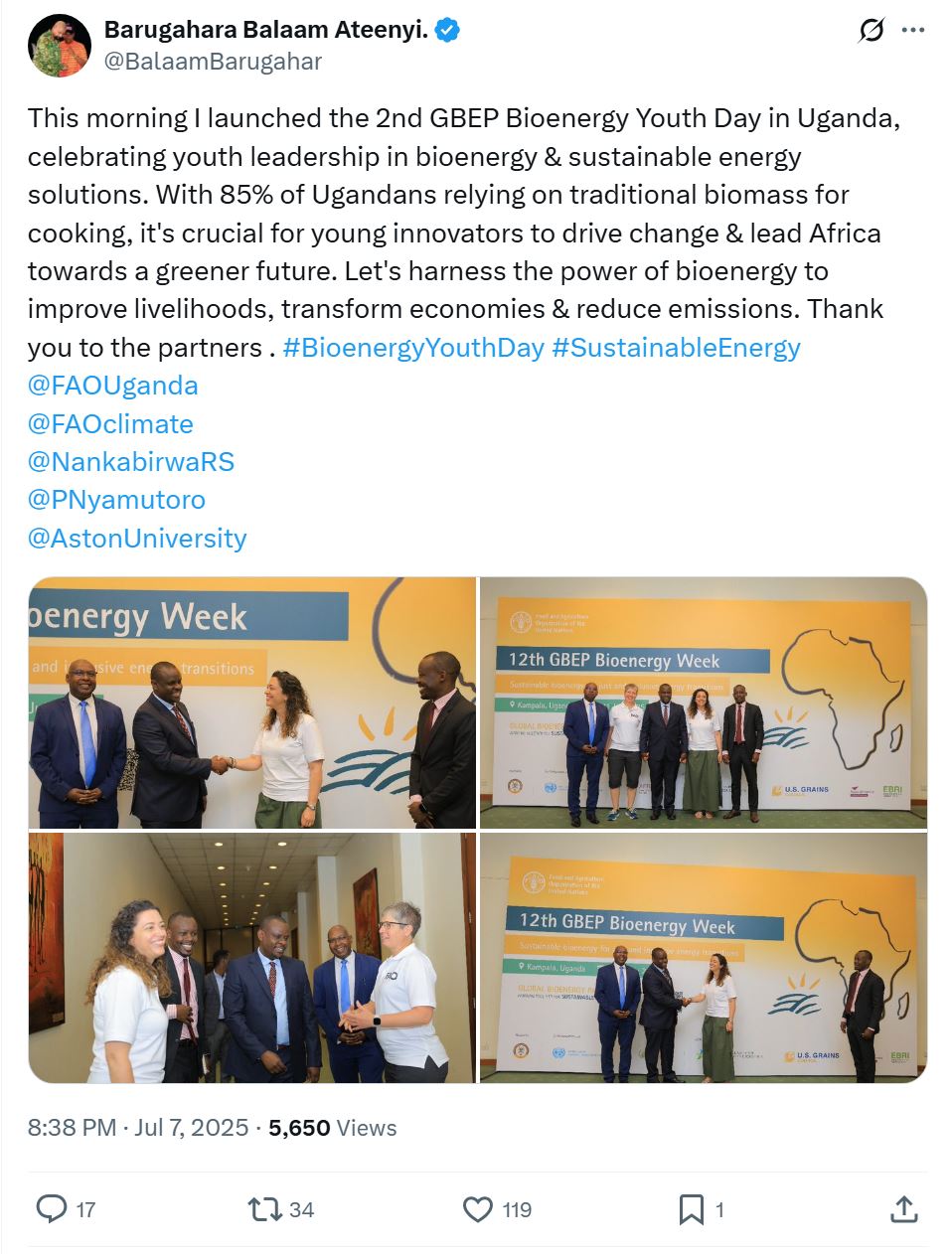
The day culminated in the GBEP Youth Award 2025 ceremony. The GBEP Youth Award is a prestigious recognition for young bioenergy researchers. This year, the award was presented to Suleiman Usman Yunusa, a young researcher from Nigeria, by Robin Nandy from the United Nations Children's Fund (UNICEF).
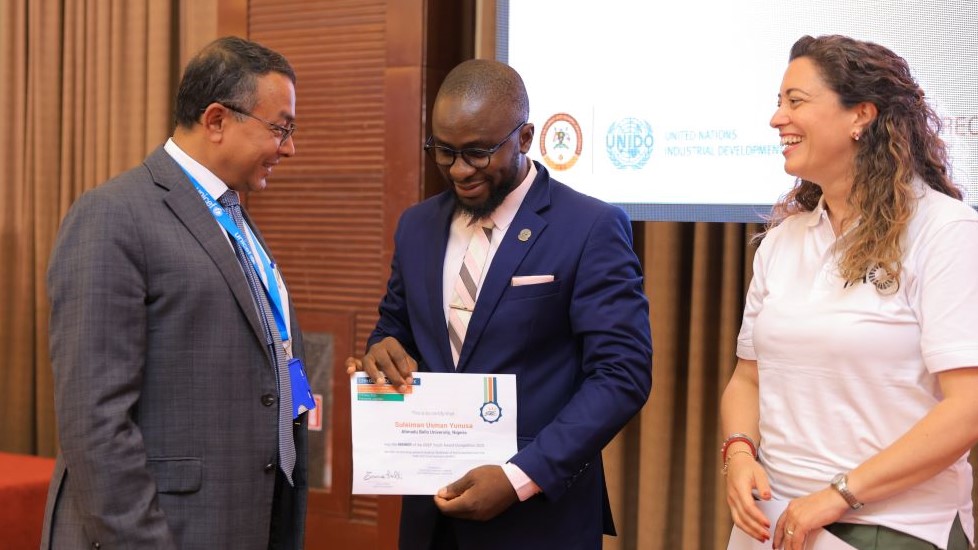
Stakeholder conference: keeping inclusion at the core of bioenergy commitments
While the first day was fully dedicated to young people, the second day marked the official beginning of the stakeholder conference.
The Honourable Dr. John C. Muyingo, State Minister for Higher Education, welcomed participants with an inspiring invitation to use the event to strengthen collaboration and transform discussions into tangible action, reminding everyone that energy access for those most in need must be considered a human right.
Mr. Yergalem Taages Beraki, FAO Representative ad interim in Uganda, underlined FAO’s commitment to GBEP and bioenergy development as part of its mission to advance Sustainable Development Goals and climate targets.
"FAO has remained deeply committed to GBEP. As an active Partner, we are dedicated to promoting sustainable bioenergy as a means to achieve better production, better nutrition, a better environment, and a better life. This commitment is reflected in FAO’s Climate Change Strategy 2022–2031, which highlights the need for accessible renewable energy, including sustainable bioenergy. "

Throughout the week, participants shared knowledge and best practices on a wide range of bioenergy-related topics, including enabling policy frameworks and financial opportunities, clean cooking solutions, gender and youth inclusion, and the integration of bioenergy into agrifood systems and urban contexts, with a view to foster a low-carbon and circular economy. Country representatives from Uganda, Kenya and Tanzania presented their national bioenergy policy and strategy, while Brazil outlined its vision for COP30, advocating for sustainable fuels and carbon credit systems.
A key milestone was the signing of the Collective Pledge by the five African Regional Centres for Renewable Energy and Energy Efficiency under the Global Network of Regional Sustainable Energy Centres (GN-SEC). The declaration pledges to accelerate sustainable bioenergy production and utilisation through regionally integrated markets.
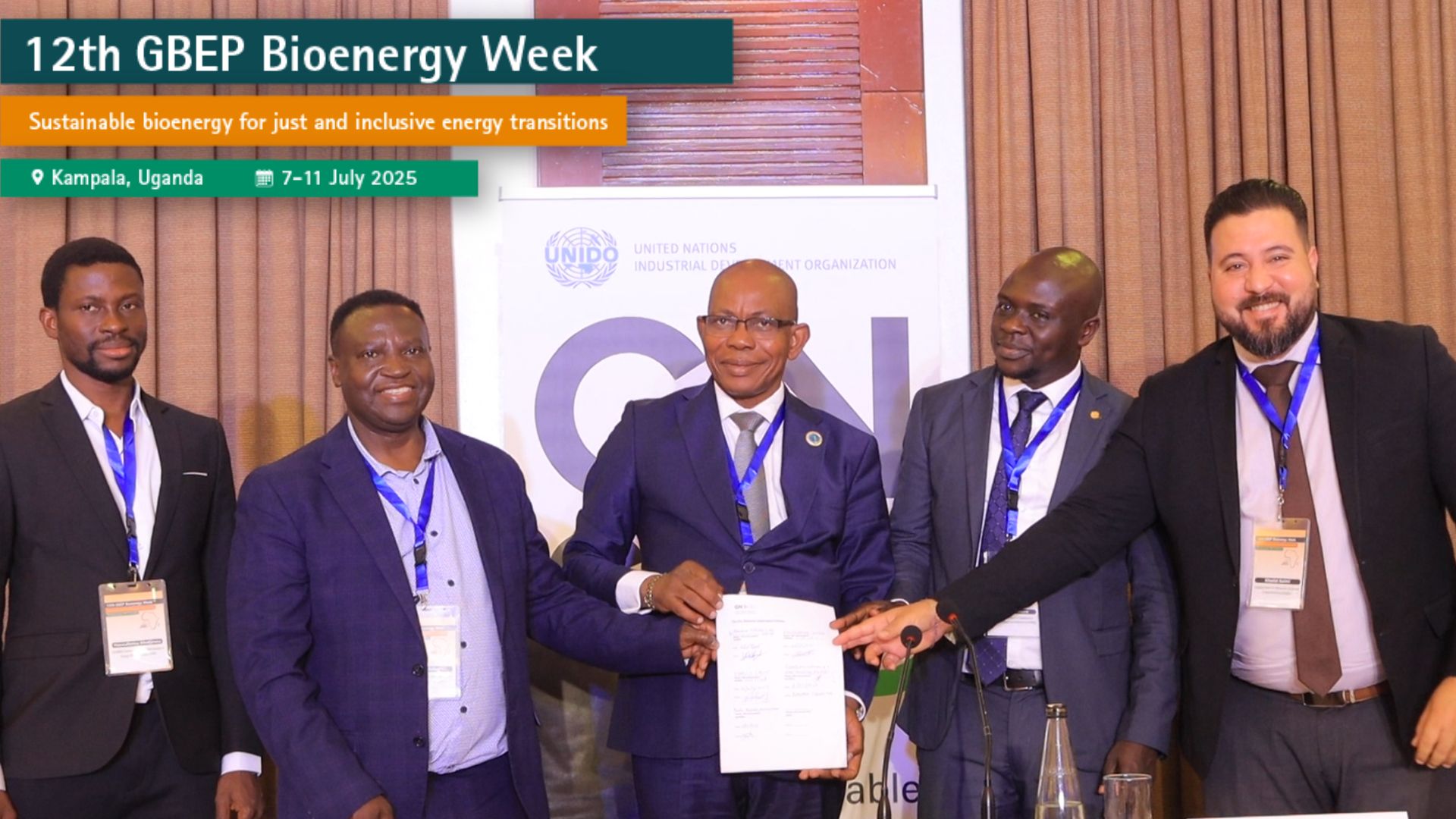
Clean cooking was a central theme, with discussions highlighting tax incentives, certification schemes, carbon finance and public awareness as key drivers of adoption. Bioenergy experts shared best practices and successful applications of tailored clean cooking solutions in various African contexts (urban and rural areas, and humanitarian settings). GBEP coordinator Tiziana Pirelli presented the findings of the latest GBEP's report,Bioethanol for clean cooking - An analysis of its role in energy transition in Africa, underlining the importance of adapting solutions to the local context and involving women and marginalized communities. Gender inclusion was repeatedly emphasised, with calls for gender-disaggregated data and inclusive policies.
As pointed out by Rocio Diaz-Chavez, Imperial College of London, “There is no guarantee that an energy transition path will be equally beneficial to all groups in society. It may reinforce or deepen existing gender and social inequalities.”
“We have the ideas, visions, means and solutions. We must ensure the energy transition truly reaches the people who need it most.", said Prof. Mirjam Röder, Aston University.
The launch of the EACREEE Gender and Social Inclusion Strategy 2025–2030, led by Dr Paulina Chiwangu, UN Women Representative to Uganda, underscored the importance of inclusive approaches.
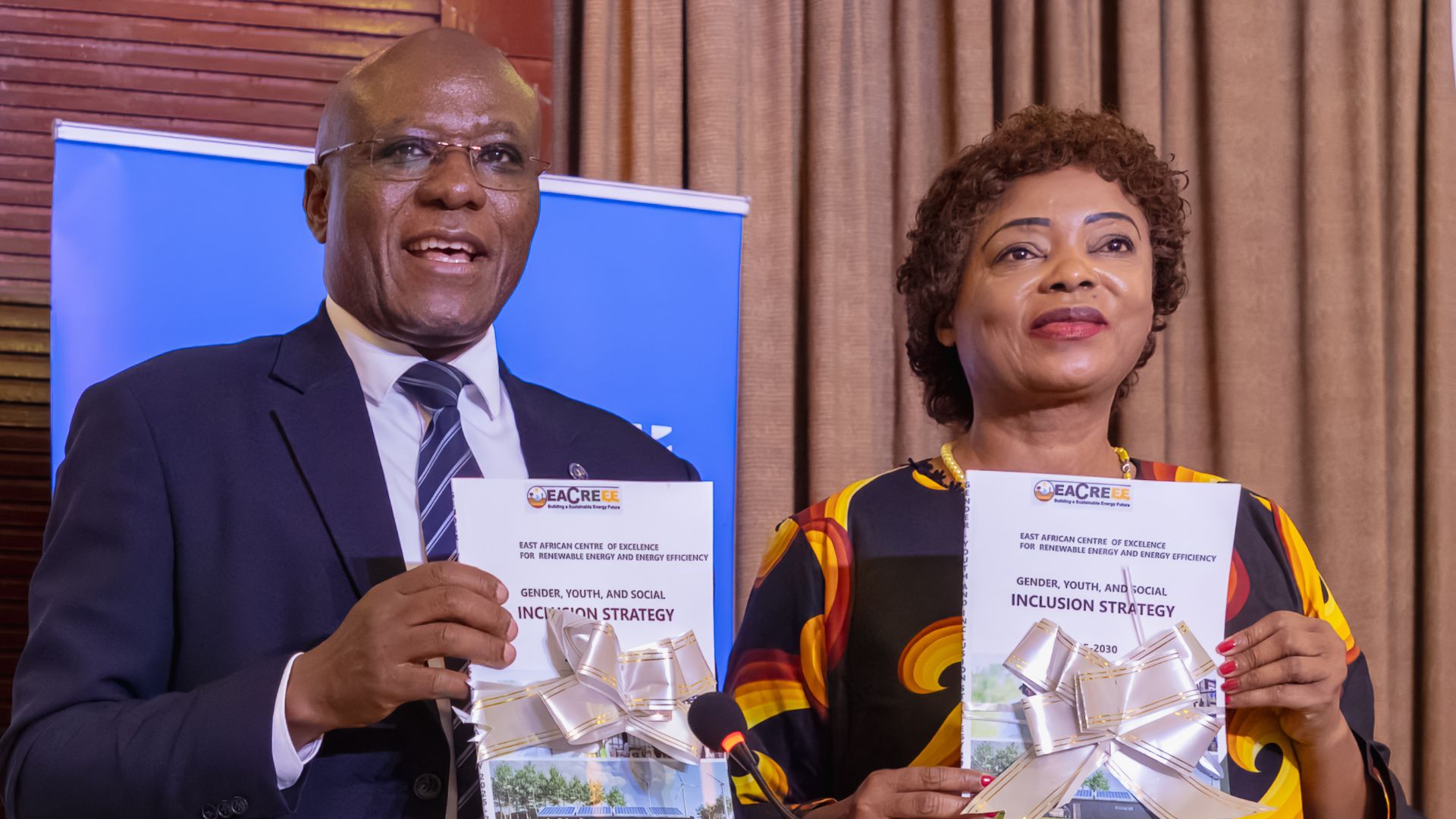
In her closing remarks, FAO’s Tiziana Pirelli, GBEP Coordinator, emphasised the importance of evidence-based, people-centred approaches:
“Bioenergy must be sustainable, evidence-based, and people-centred; complementing, not competing with, food production, and reaching those historically left behind in energy planning.”
Hon. Daudi Migereko, Chair of Uganda’s National Biofuels Committee (NBC), and former Minister of Energy and Mineral Development and Lands, on behalf of the government of Uganda, echoed this sentiment, stating: “[the] GBEP conference has reaffirmed that sustainable energy is not just about technology: it is about people, communities, equity and resilience. We are especially focused on ensuring that our energy transition is inclusive, benefiting youth, women, smallholder farmers and those in vulnerable settings.”
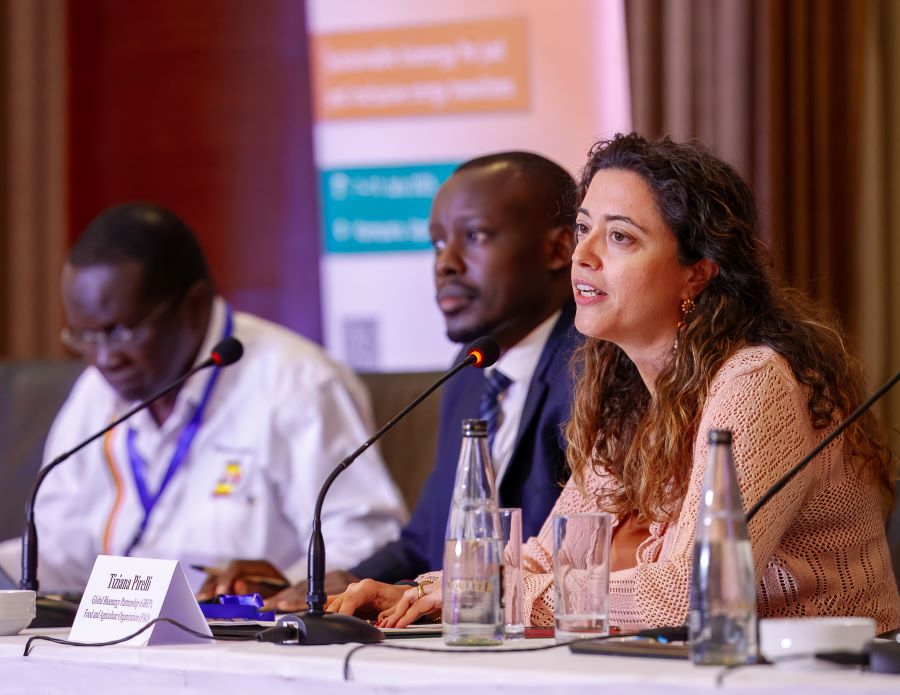
From words to action
The week concluded with a field visit to the National Livestock Resources Research Institute (NaLIRRI) of Uganda’s National Agricultural Research Organization (NARO), and to BioBurn Energy Limited, showcasing practical examples of bioenergy innovation in Uganda.
At NaLIRRI, a Livestock Bioenergy and Environment Research Unit ("Zero-waste Unit") has been established to advance sustainable animal production through bioenergy generation, waste recycling and eco-friendly innovations. The Unit’s research focuses on the production of renewable energy and innovative bio-products from livestock waste, such as biofertilizers, biopesticides, and cosmetics for GHG mitigation and circular economy.
In the second half of the day, participants visited the premises of BioBurn Energy Solutions Ltd, a private company manufacturing biomass pellets from forestry residues, as well as pellet cookstoves.
The 12th GBEP Bioenergy Week reaffirmed the role of sustainable bioenergy as a catalyst for agricultural development, climate action, and social inclusion. The work towards fair and just clean energy transitions that leave no one behind continue, grounded in partnerships, driven by innovation, and centred on people.

